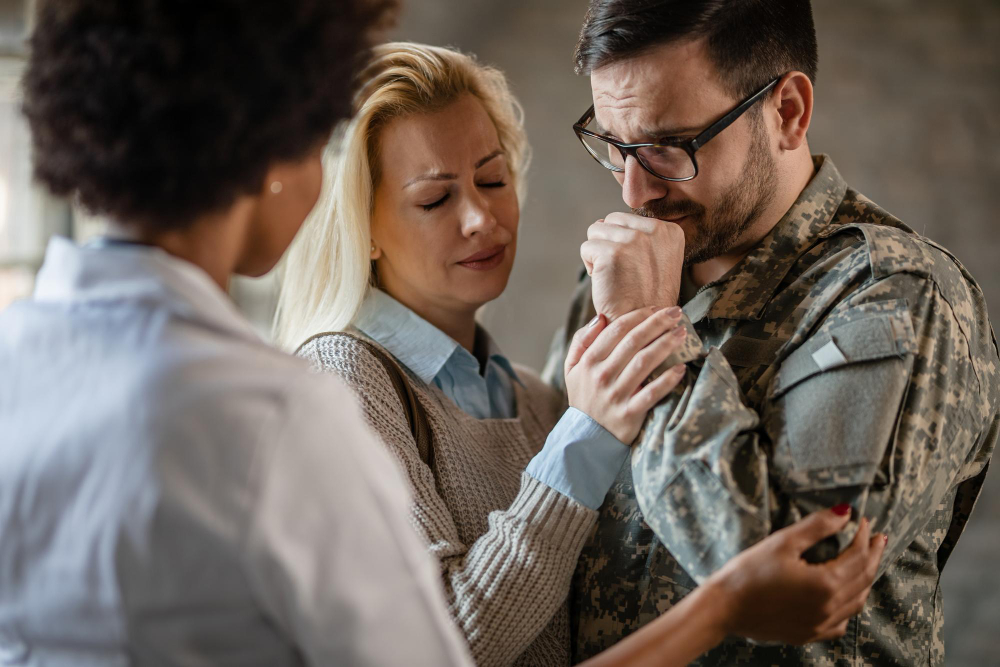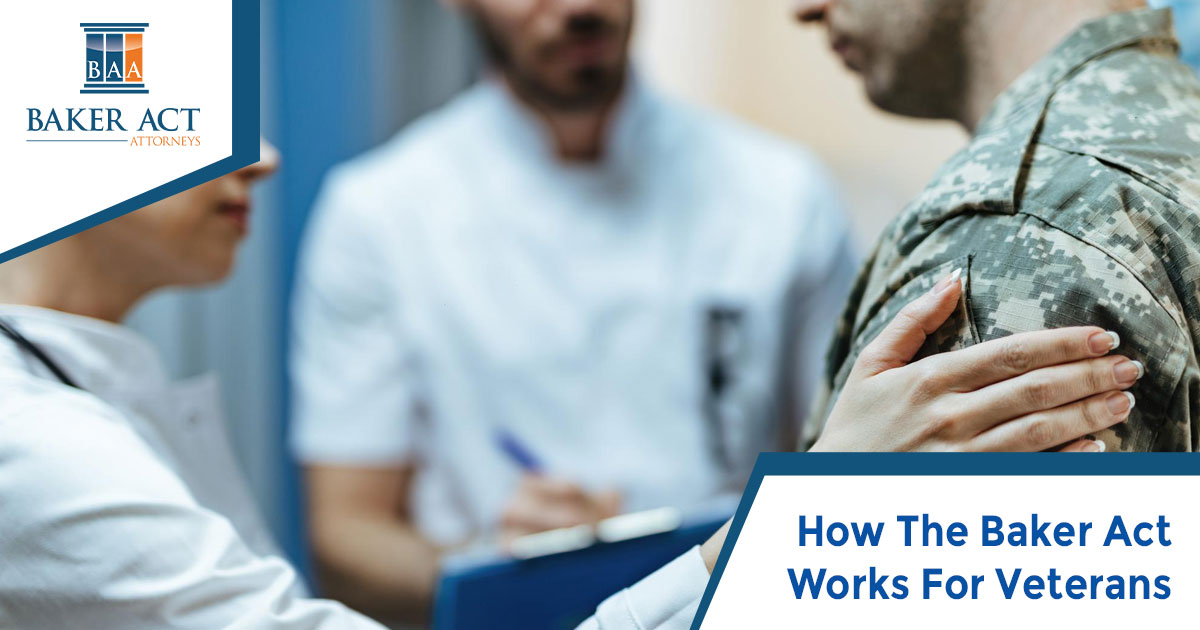Although millions of Americans struggle with mental health, veterans are particularly at risk. Given the nature of their work and the types of environments it puts them in, it’s no surprise that post-traumatic stress disorder (PTSD), depression, behavioral changes, and substance abuse commonly affect Florida’s more than 1.4 million veterans. Unfortunately, these veterans do not always get the care and support they need, and in some cases, end up in a worse condition after being improperly Baker Acted by the Department of Veteran Affairs (VA).
In this article, we take a look at the unique interplay between Florida’s Baker Act and the VA’s services, and set out the steps you need to take if your loved one is a veteran who is experiencing a mental health crisis.

Mental Health Challenges Facing Veterans
Veterans offer invaluable service to the nation, but this often comes at great personal cost. Research estimates that nearly a third of veterans who were deployed in Iraq and Afghanistan will develop PTSD at some point in their lives, and one in ten will develop a substance abuse disorder. Veterans have higher rates of depression than the general population and are at greater risk of suicide.
Clearly, veterans require dedicated mental healthcare and psychological support, particularly if they were deployed in active combat. The Veteran Health Administration (VHA) is the largest integrated healthcare network in the country, and provides millions of veterans with medical, rehabilitative, and psychological treatment every year. Although many veterans receive quality care through these services, this is not always the case. In the past few years, there have been several cases involving veterans who were improperly Baker Acted after attending a VA facility for mental health support, with these episodes ultimately worsening their conditions.
Many veterans and their families would be surprised to learn that there is a chance they could be unlawfully Baker Acted simply by accessing VA mental healthcare services. If you are the loved one of a veteran, it is crucial that you place yourself in the best possible position to support them by developing an understanding of the interplay between the Baker Act and VA care services.

What Is The Baker Act?
The Baker Act is a Florida statute that sets out the legal process by which a severely mentally ill person may be involuntarily detained in a receiving facility for assessment and stabilization. The intent of the Act is to ensure that those with serious mental illness who pose a risk of harm to themselves or others are given the quality care and treatment they need. The Baker Act process may be initiated by a law enforcement officer, a qualified professional, or a court following a petition brought by a third party.
The first stage in the process is called ‘involuntary examination’. This is when a person is given emergency assessment and stabilization (if necessary) and held in a receiving facility for a period of up to seventy-two (72) hours while they undergo an involuntary psychiatric assessment. An appropriately qualified medical professional, such as a psychiatrist, physician, or clinical psychologist, must perform the assessment. If it is determined that the individual requires further psychiatric treatment, the facility must petition the court to grant an order for ‘involuntary placement’. IA court may thereafter require the person to remain in the facility for a further period of up to six (6) months to undergo treatment.
How Is The Baker Act Applied To Veterans?
The Baker Act can only be used to involuntarily detain someone if they meet specific criteria, and these criteria apply to veterans in the same way that they do to ordinary civilians. An individual can only be held for involuntary examination under the Baker Act if there is clear evidence that:
- They are experiencing mental or emotional impairment to such an extent that they can no longer perceive reality or exercise self-control, and this interferes with their ability to cope with day-to-day life;
- As a result of this impairment, they are unable to determine whether they require psychiatric treatment, or have refused treatment entirely; and
- Without examination and treatment, they are likely to suffer from harmful neglect, or there is a real risk that they will seriously harm themselves or others.
Although the Baker Act criteria apply equally to civilians and veterans, a different process follows once it has been established that these criteria have been met. Specifically, in the case of a person who meets the criteria and who is also a veteran, the court may order that they be taken to a VA facility (instead of a regular receiving facility) for assessment and stabilization. If a veteran attends a VA healthcare facility and a medical professional determines that they meet the above criteria, they can be held for involuntary examination at that facility.

Complexities In The Interplay Between The Baker Act and The VA’s Authority
Initiating an involuntary Baker Act hold is already a complicated and administratively intensive process as it is, and in the case of veterans, yet further layers of complexity are added. This is because the Baker Act is a state law, but the VA is a federal agency. This has raised challenging questions for Baker Act attorneys who are representing veterans that have been improperly Baker Acted.
In ordinary Baker Act cases, there is no question that Florida courts have jurisdiction over Florida’s Baker Act treatment facilities, and can require such facilities to release a person being held under the Baker Act. However, in the case of veterans, the position is less straightforward: does the court’s jurisdiction extend to a federal agency? The most plausible interpretation of the Act is that, since the VA is applying a state law when it uses the Baker Act to detain a veteran, its actions fall under the jurisdiction of Florida’s state courts – even though it is a federal agency. Given the complicated legal position, it is advisable that you consult with a Baker Act attorney if you think your loved one may require a Baker Act intervention.
Supporting A Veteran Struggling With Mental Health
If your loved one is a veteran in need of psychological support and treatment, it is important that you understand how the Baker Act and VA care services work together so that you can help them access treatment in a timely and effective way. Filing a petition for the involuntary examination of a veteran involves specific procedures that are not applicable in civilian Baker Act cases, so your attorney will play a critical role in ensuring the petition complies with state and federal laws.
Veterans also qualify for specialized treatment services offered by the VHA, which is staffed by medical professionals with experience in catering to veterans’ unique needs, such as providing care for service-related trauma. The VHA plays a special role in providing follow-up care and treatment after a Baker Act intervention, so your lawyer will coordinate with their treatment facilities and outpatient clinics to ensure that your loved one receives the tailored care that they need.
Experienced Baker Act Attorneys Are Here To Assist You
If your loved one is a veteran experiencing a mental health crisis, it is crucial that you take action as soon as possible to help them access the psychological support they need. The team at Baker Act attorneys has years of experience in helping veterans and their families navigate Baker Act procedures, and will be able to advise you on the most appropriate intervention for your loved one.
In the unfortunate case that your loved one has been improperly detained by a VA facility and you need to challenge an involuntary Baker Act, we are also on standby to help you fight for their release and ensure they have access to appropriate outpatient services that are more suitable for their needs.
For all your veteran-related Baker Act concerns, contact our compassionate team of attorneys today at 855-429-0074.

